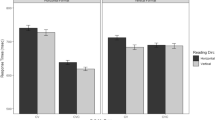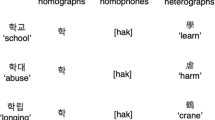Abstract
The Korean orthography uses both alphabetic Hangul and logographic Hanja. Two experiments investigated semantic and phonological processing of words written in the two scripts. In the experiments, Korean readers had to respond to words either in a pure context with words from one single script or in a mixed context with words from the two scripts. The task was naming in Experiment 1 and semantic categorization in Experiment 2. The results showed that for Hangul words, there were significant word frequency effects in categorization, but not in naming, and that there were reliable script-switching effects in naming, but not in categorization. For Hanja words, however, there were clear and strong effects of words frequency, regardless of the task used, but significant effects of script-switching were only observed in categorization. These results suggest that the strategies adopted in processing Hangul and Hanja words are determined both by task demand and nature of the script.
Similar content being viewed by others
References
J.-R. Cho H.-C. Chen (1999) ArticleTitleOrthographic and phonological activation in the semantic processing of Korean Hanja and Hangul Language and Cognitive Processes 14 IssueID5/6 481–502 Occurrence Handle10.1080/016909699386167
R. Frost L. Katz S. Bentin (1987) ArticleTitleStrategies for visual word recognition and orthographical depth: A multilingual comparison Journal of Experimental Psychology: Human Perception and Performance 13 104–115 Occurrence Handle10.1037//0096-1523.13.1.104
H. Kang G.B. Simpson (2001) ArticleTitleLocal strategic control of information in visual word recognition Memory & Cognition, 29 648–655
S.S. Lee K.D. Lee K.S. Nam C.S. Chung I.K. Lee Y.C. Choi (1991) Development of a corpus of contemporary Korean for compiling a lexicographical database Korean Dictionary Compilation Board of Yonsei University Seoul, Korea
R.F.I. Meuter A. Allport (1999) ArticleTitleBilingual language switching in naming: Asymmetrical costs of language selection Journal of Memory and Language 40 25–40 Occurrence Handle10.1006/jmla.1998.2602
T.J. Park (1990) ArticleTitlePhonological encoding when reading Chinese-character-words in Korean Korean Journal of Experimental and Cognitive Psychology 2 90–102
J.G.W. Raaijmakers J.M.C. Schrijnemakers F. Gremmen (1999) ArticleTitleHow to deal with “the language-as-.xed-effect fallacy”: Common misconceptions and alternative solutions Journal of Memory and Language 41 416–426 Occurrence Handle10.1006/jmla.1999.2650
R.D. Rogers S. Monsell (1995) ArticleTitleCosts of a predictable switch between simple cognitive tasks Journal of Experimental Psychology: General 124 207–231 Occurrence Handle10.1037//0096-3445.124.2.207
M. ullah S. Monsell (1999) ArticleTitleThe cost of switching between Kanji and Kana while Reading Japanese Language and Cognitive Processes 14 IssueID5/6 567–607 Occurrence Handle10.1080/016909699386194
D. Shen K.I. Forster (1999) ArticleTitleMasked phonological priming in reading Chinese words depends on the task Language and Cognitive Processes 14 IssueID5/6 429–459 Occurrence Handle10.1080/016909699386149
G.B. Simpson H. Kang (1994) ArticleTitleThe .exible use of phonological information in word recognition in Korean Journal of Memory and Language 33 319–331 Occurrence Handle10.1006/jmla.1994.1015
P. Tabossi L. Laghi (1992) ArticleTitleSemantic priming in the pronunciation of words in two writing systems: Italian and English Memory & Cognition 20 303–313
I. Taylor (1997) Psycholinguistic reasons for keeping Chinese characters in Korean and Japanese H.-C. Chen (Eds) Cognitive processing of Chinese and related Asian languages. 319 Chinese University Press Hong Kong 299–319
G.C. Orden Particlevan (1987) ArticleTitleA ROWS is a ROSE: Spelling, sound and reading Memory & Cognition 15 181–198
Author information
Authors and Affiliations
Corresponding author
Additional information
The Research Grant from the Korea Research Foundation to J.-R. Cho (KRF-2001-013-C00152) supported this research. Also, this work was partially supported by a grant from the Research Grants Council of the Hong Kong Special Administrative Region, China (CUHK4142/04H) and a Direct Grant for Research from the Social Science and Education Panel of the Chinese University of Hong Kong to H.-C. Chen. We are grateful to Hye-Ran Whang, Ji-Sun Kim, and Bong-Kyung Kang for their assistance in data collection.
Rights and permissions
About this article
Cite this article
Cho, JR., Chen, HC. Semantic and Phonological Processing in Reading Korean Hangul and Hanja Words. J Psycholinguist Res 34, 401–414 (2005). https://doi.org/10.1007/s10936-005-6140-x
Issue Date:
DOI: https://doi.org/10.1007/s10936-005-6140-x




